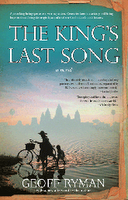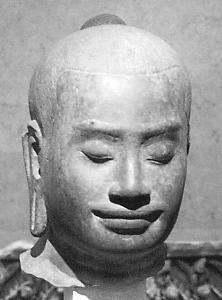Jayavarman 7th comes to life
 Did you ever get to buy a copy of Geoff Ryman's The King's Last Song - if not, why not? It's the best novel written about Cambodia for ages. I urge you all to get a copy. Here's my review at the time of the book's release together with a short Q&A with the author.
Did you ever get to buy a copy of Geoff Ryman's The King's Last Song - if not, why not? It's the best novel written about Cambodia for ages. I urge you all to get a copy. Here's my review at the time of the book's release together with a short Q&A with the author.Review: I eagerly awaited Geoff Ryman's novel, The King's Last Song, that links the glories of the Angkor dynasty of King Jayavarman VII with modern-day Cambodia, and I was richly rewarded. It's excellent. I particularly loved the passages that yielded such a vivid and atmospheric recreation of life in the court of the King during the twelfth century that I could almost taste it. Okay, much of it was from the author's own imagination, but I believed it. The book swirls around the life story of Jayarvarman VII written on gold leaves which are found and subsequently stolen. The hunt is on for their recovery and with it, we gain an insight into the Cambodia of today. This book sets a towering standard for new fiction writing on Cambodia that will be difficult to match, let alone exceed. I take my hat off to the author for a wonderful and evocative story that I found impossible to put down. I urge everyone with an interest in Cambodia to buy this book and then encourage your friends and family to do the same.
Q&A Interview: In the run-up to the book's release in March 2006, I asked Geoff Ryman to fill in some of the blanks about the book itself and his interest in the country.
You are widely known for your science fiction and fantasy books, so why a mainstream fictional novel about Cambodia, and what was the catalyst for the book? "I've certainly written and won awards for my SF novels, but they're only about half my work. The most successful novel was 253, about 253 Londoners on a train. It crashes. But mostly the passengers just sit. Was, a historical novel, used The Wizard of Oz as a way into different eras of American history and different kinds of American childhoods, from the 1870s to 1989. In particular about half the book was set in Kansas in the 1870s. The catalyst. Well my first successful fantasy novella, The Unconquered Country was a phatasmagoria around Cambodia. I'd seen a photograph in Look magazine in the States which showed a Cambodian woman in hospital next her soldier husband, not realising he was dead. The image just wouldn't go away, it haunted me for years, especially during and just after the Pol Pot era, when it would have been difficult to travel. Unconquered Country finally came out in 1985. In 2002 I was invited by friends to stay at the Australian archaelogical dig at Siem Reap. I was very lucky and got a tour from the dig director Roland Fletcher of all the monuments in the order they were built, which was an overwhelming introduction to the history. I came back and immediately started to write the Jayavarman sequences. But there was a lot of expense, research, travel and reading to be done. I went back to Cambodia 4 times in two years, the last trip funded by the Author's Foundation. On my second trip, meeting so many Cambodians during the research inspired the modern plot and the whole modern half of the book took off from there."
How close are your ties to Cambodia today? "Gosh, the ties should be closer. While there the last time I tried to help set up a writing workshop. I also recorded and got broadcast on Resonance FM a ninety-minute piece about arts in Cambodia. But a lot of pretty severe changes in my personal life have just got in the way of getting back enough...my mom in California is very ill, etc."
Can you give a brief precis of The King's Last Song? "The made up bit of the story is that Jayavarman VII's son has dictated to him his father's personal memoir. It is written on gold leaves to avoid decay and insects, but during the pro Hindu revolt, the book is buried to preserve it from destruction. We do know from a fragmentar inscription translated by Saveros Pou that texts were ordered to be written on gold. Indeed, the person commanding the writing did have the title Jayavarman, but....so there is some justification for this conceit. In 2004, the fictional memoir is accidentally discovered again. There is widespread concern that such a treasure, containing Jayavarman's words, is not stolen. Unfortunately, it is stolen at gunpoint, and the general and the dig director protecting it are taken hostage. The modern story concerns the efforts of two modern Cambodians to get the book and the Professor back. Map is a Patrimony Policeman with too many bad memories of the wars. Veasna, a motoboy in his 20s helps him... without being aware that during the Pol Pot era, Map killed his parents. This relationship is mirrored by that of the Professor, a Frenchman called Luc Andrade, and his kidnapper, en ex-Khmer Rouge cadre. By the end of the novel, both of them are working together to translate the Sanskrit of the original into modern Khmer. Intercut with the efforts to get the book back and to translate it are flashbacks to 1960, 1967 and in one long section to do with Map, 1988 and 89. About half the book is idylls of the King, sections of Jayavarman's life from age six up to the consecration of Preah Khan in 1191. It is also interspersed with sections from the fictional memoir. Some poetic license is needed to get the story to flow, and there is still a lot we don't understand about J.VII's life. So I've had to make up/fill in gaps against a considerable amount of disagreement among scholars as to when he might have been born, what his relationship was with the Chams, etc. So the book is a kind of a collage around Cambodian themes. One thing it does not have is a chapter set in the Khmer Rouge era. That time has been more than adequately covered by people who lived through it." For more, click here.
A 12th century portrait of Jayavarman VII at the Guimet Museum in Paris


0 Comments:
Post a Comment
<< Home